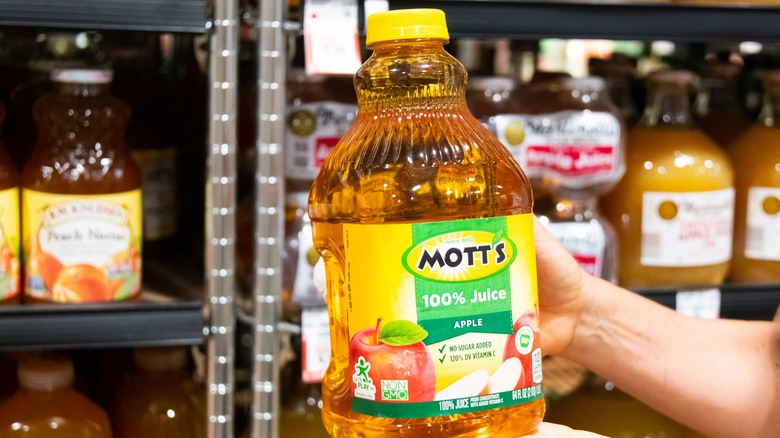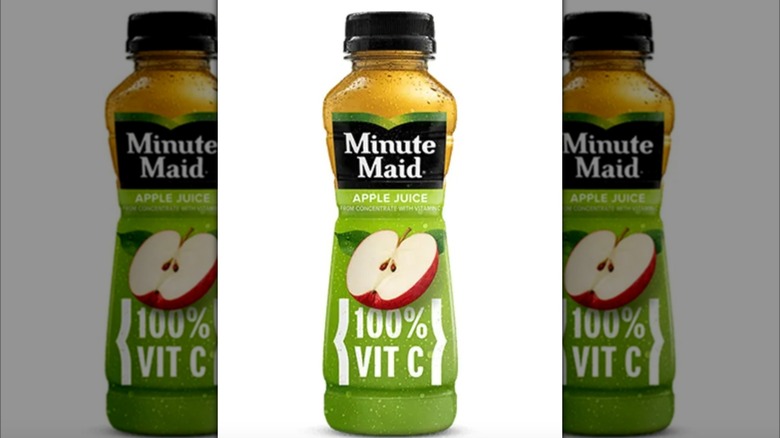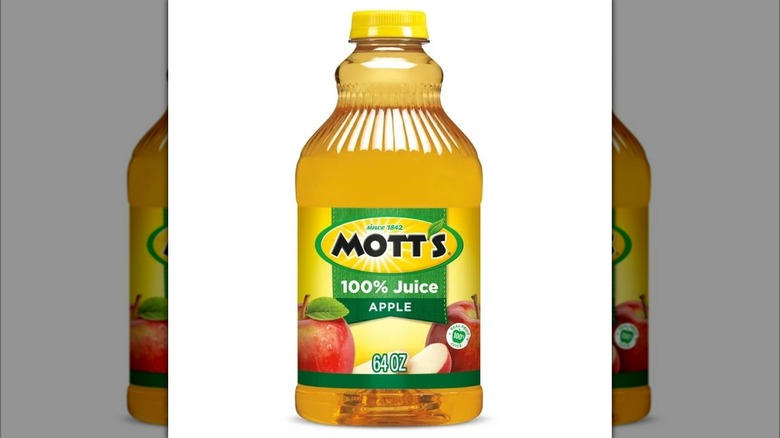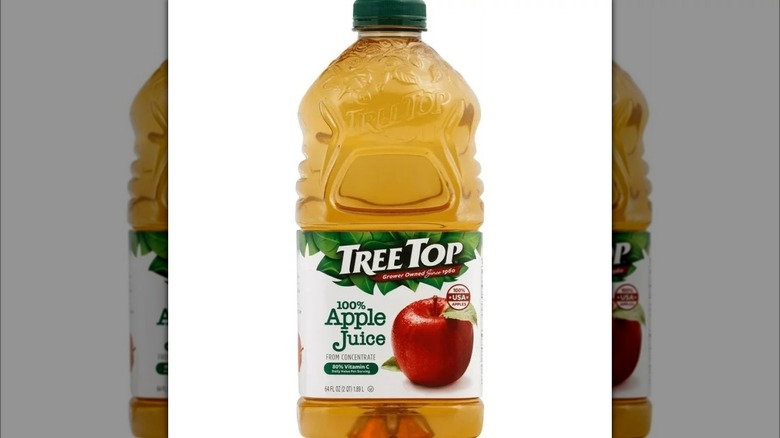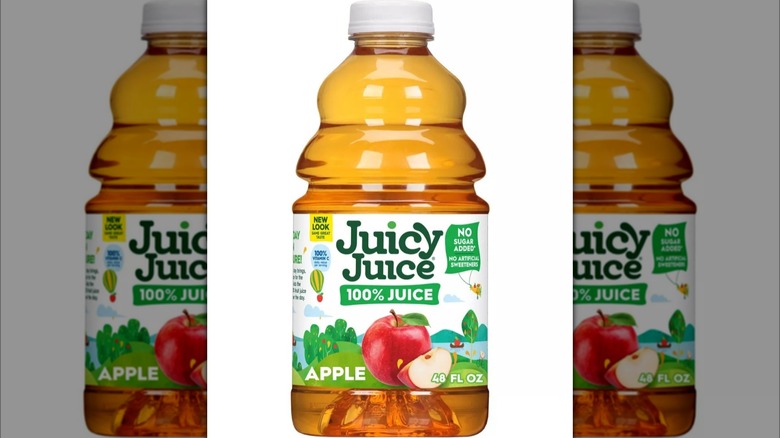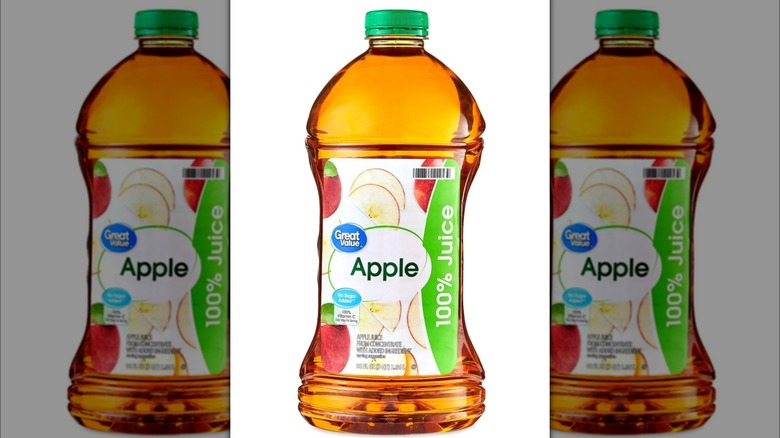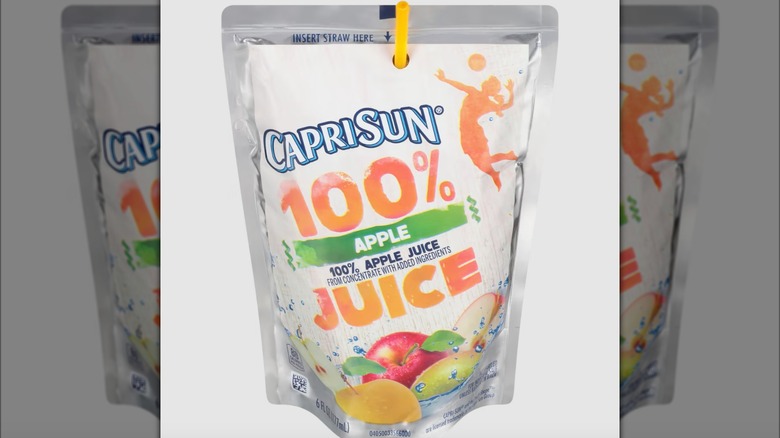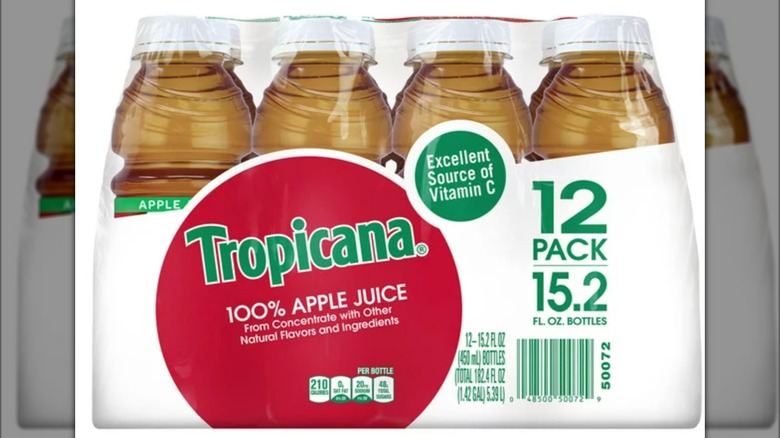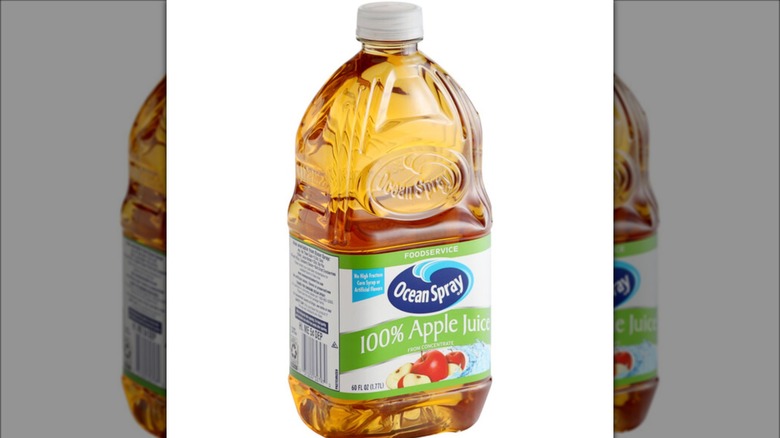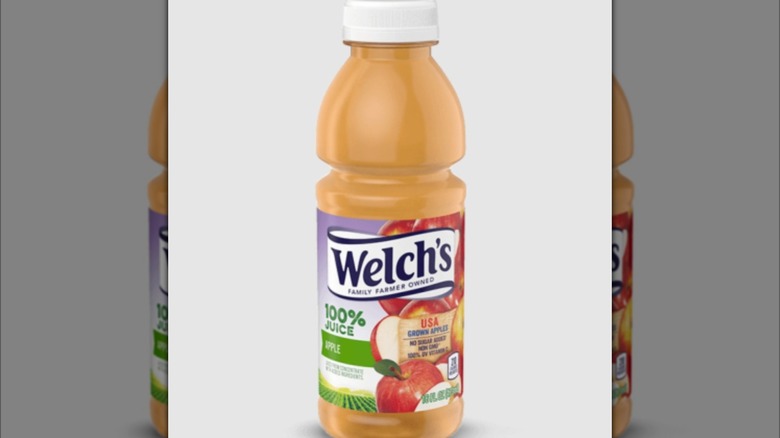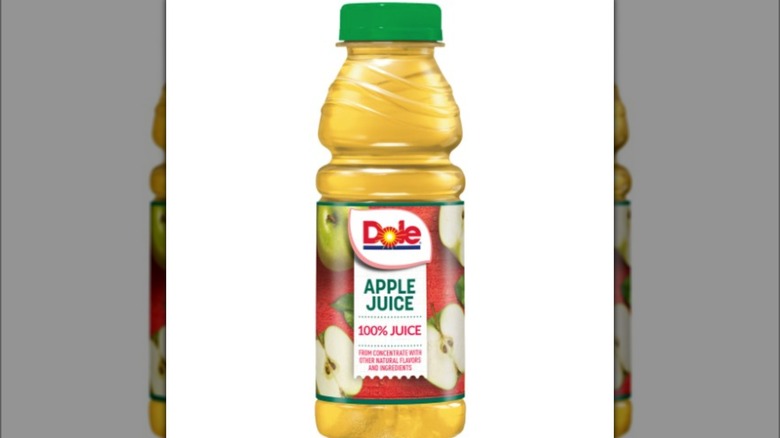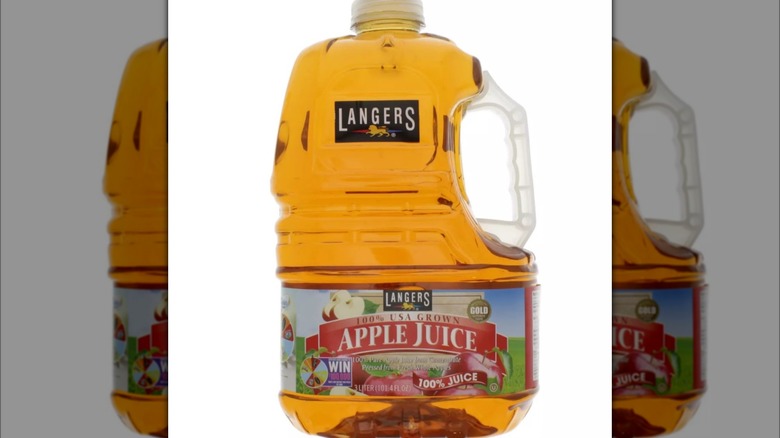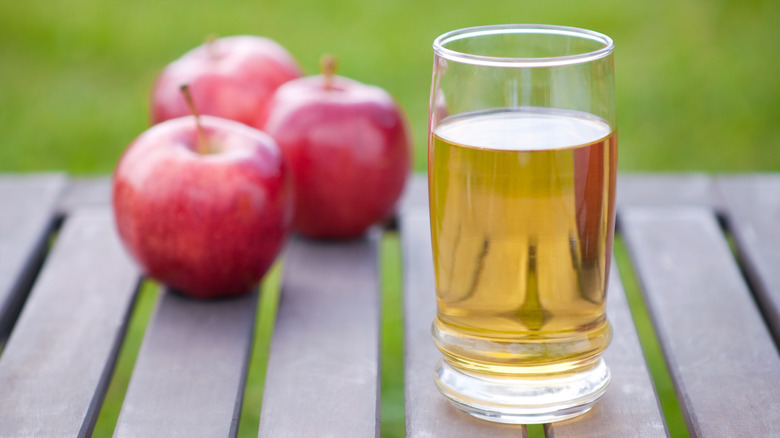11 Unhealthiest Apple Juice Brands And Why You Should Avoid Buying Them
When scouring the aisles of your local supermarket for healthy beverage options, it's easy to be misled by products that appear nutritious at first glance. Apple juice, a staple in many households, often falls into this deceptive category. While apple juice, particularly brands that claim to be made from 100% juice, might seem like a wholesome choice for kids and adults alike, not all brands are created equal. In an effort to promote better health choices, we've identified 11 apple juice brands that might be best left on the shelf or, at the very least, consumed in healthy moderation alongside a healthy diet and lifestyle.
Our selection criteria for brands we consider to be less healthy than others on the market focuses on things like added sugars, calorie content, the presence of artificial ingredients, processing methods, and overall nutrient content and density. We aim to unpack the detailed nutritional information behind each brand, comparing their nutritional makeup to daily recommended intakes, and explaining how certain ingredients could potentially impact your health. All this considered, it is important to remember that what is considered "healthy" may be different for everyone. Each person's dietary needs differ, and you should talk to your doctor before making any significant dietary changes.
1. Minute Maid Apple Juice
Minute Maid Apple Juice, a staple brand in many households, attracts families looking for convenient beverage options from a trusted manufacturer. However, the nutritional composition of this popular brand's apple juice reveals some facts worth considering. A single 12-ounce bottle contains about 170 calories and a staggering 39 grams of sugar. This amount equates to approximately 10 teaspoons of sugar, which significantly exceeds the daily sugar intake recommendations from the American Heart Association — no more than 6 teaspoons of added sugar per day for women and 9 for men.
The excessive sugar content in Minute Maid Apple Juice, mainly derived from concentrated apple juice, poses health risks when consumed in high quantities regularly. It's important to note that the juice lacks the dietary fiber found in whole apples. Fiber plays a crucial role in moderating blood glucose levels and maintaining a healthy digestive system, which is absent in the processed juice form. Additionally, the inclusion of preservatives like ascorbic acid, while common in many processed foods to maintain shelf life and color, does not compensate for the nutritional deficiencies of the juice. The processing involved in creating apple juice concentrate from which Minute Maid is made also diminishes the natural nutrients found in fresh apples.
For consumers seeking healthier beverage alternatives, opt for juices free from preservatives and made from 100% juice that is not derived from concentrate. These options tend to retain natural nutrients and are closer in nutritional value to their fresh fruit counterparts.
2. Mott's 100% Apple Juice
Mott's Apple Juice is another familiar brand that fills many household refrigerators. The brand markets itself well, boasting that it is made with 100% apple juice without any added sugar or artificial sweeteners, colorings, or flavorings. Although this is beneficial for concerned customers, it's important to note the nutritional facts about Mott's apple juice before consuming it daily.
Each 8-ounce serving delivers 120 calories and 28 grams of sugar. This brand often markets its juice as an excellent source of vitamin C; however, the high sugar content overshadows the potential benefits of the juice's additional vitamin C. Consuming such high-sugar beverages regularly can lead to long-term health problems. Additionally, Mott's juice often includes added ingredients like ascorbic acid for preservation, which while not harmful, suggests the juice has undergone considerable processing. Consumers should be wary of the implications of regular intake of high-sugar juices like Mott's and might consider diluted juice options or, ideally, whole fruit as healthier alternatives.
3. Tree Top Apple Juice
Tree Top Apple Juice, often promoted for being made from 100% USA apples, also suffers from similar issues as its counterparts when you consider the information on its nutrition label. Each 8-ounce serving contains 110 calories and 25 grams of sugar, which although slightly lower than some other brands, is not an insignificant amount of sugar for a single beverage. While Tree Top does not add artificial flavors or colorings, the high concentration of natural sugars from the fruit concentrated apple juice used by this brand still poses a risk for calorie overconsumption and ensuing health problems associated with regular high sugar intake.
For those who enjoy apple juice, Tree Top's transparency about using American-grown apples and no artificial ingredients might be appealing, but the high sugar content remains a significant drawback. Consumers looking to reduce sugar intake overall might consider mixing this juice with water to lower the sugar concentration per serving.
4. Juicy Juice Apple Juice
Juicy Juice markets itself by offering 100% apple juice with no added sugars, projecting an image of natural wholesomeness that appeals to many health-conscious consumers. However, the implications of the brand's sugar warrants a deeper look into the product and its nutrition facts. An 8-ounce serving of Juicy Juice Apple Juice contains 110 calories and a significant 27 grams of sugar. This level of sugar, despite being naturally occurring, is equivalent to about 6 ½ teaspoons, an amount that rivals many sugary soft drinks.
The main concern here is that the sugar in Juicy Juice comes from concentrated apple juice. Concentrating juice involves reducing its water content, which significantly increases sugar concentration per volume compared to the original fruit. This process also strips away much of the beneficial dietary fiber found in whole apples, which is crucial for slowing sugar absorption and aiding digestive health. Without this fiber, the body processes juice sugar more rapidly, leading to quicker spikes in blood sugar.
For those seeking healthier alternatives, there are options. Brands that mix apple juice with other lower-sugar fruit or vegetable juices can provide a beverage that is less concentrated in sugars. Another simple and effective choice is diluting apple juice with water or sparkling water to reduce sugar intake per serving. These alternatives help maintain hydration and provide essential nutrients without the excessive sugar load found in many commercial fruit juices.
5. Great Value Apple Juice
Great Value, the private label and in-house brand from Walmart, offers an apple juice that is economically priced but also packed with sugars. Like many other store brands, Great Value Apple Juice is made from concentrate and includes added ingredients like ascorbic acid (vitamin C) for flavor and preservation. The brand markets the additional vitamin C as a benefit to the apple juice, however, drinking extra vitamin C isn't necessarily as beneficial to consumers as avoiding drinks as high in sugar as Great Value's apple juice.
Each 8-ounce glass contains 110 calories and a whopping 28 grams of sugar, mirroring the high-sugar values found in other commercially available apple juices. Regardless of being made with 100% apple juice, the concentrated nature of the product means that regular intake of this high-sugar apple juice can lead to health complications. Shoppers at Walmart might want to bypass this option in favor of healthier beverage choices or seek out brands that are lower in sugar and closer to being "whole" in their nutritional offerings.
6. Capri Sun Apple Juice
Capri Sun Apple Juice, known and loved by kids and parents for its convenient pouch packaging, might seem like a great kid-friendly option for a refreshing beverage. However, the popular kids' drink brand comes with its own set of concerns, even for products like its apple juice. Although each pouch contains only 80 calories and 20 grams of sugar, making it one of the lower-calorie options on this list, the sugar content is still significant, especially considering the small serving size. Children who consume multiple Capri Sun pouches a day may exceed their daily recommended sugar intake, leading to potential health issues.
Additionally, Capri Sun Apple Juice contains added ingredients like citric acid and natural flavors, which while generally recognized as safe, indicate a level of processing that takes the apple juice further from all-natural. Parents looking for healthier alternatives may opt for drinks like unsweetened apple juice or encourage children to drink less sugary beverages like water.
7. Tropicana Apple Juice
Tropicana is a well-known juice brand that offers various fruit juice drinks, including apple juice. While Tropicana markets itself as using 100% pure pressed apples with no added sugars, the high sugar content from natural fruit sugars still presents significant concerns for health-conscious consumers. For reference, a typical 12-ounce serving of Tropicana 100% Apple Juice contains 170 calories and a staggering 36 grams of sugar, higher than many other leading brands on our list. Regular consumption of such sugary beverages can contribute to an increased risk of chronic health concerns.
On top of the nutritional concerns, Tropicana Apple Juice appears to undergo extensive processing, including pasteurization and deaeration, which can strip away some of the natural nutrients found in fresh apples. Additionally, Tropicana includes preservatives such as vitamin C, natural flavors, and malic acid. Shoppers seeking a healthier alternative might consider homemade apple juice or brands that offer cold-pressed options with no added preservatives.
8. Ocean Spray Apple Juice
Ocean Spray is widely recognized for its cranberry-based products, but its apple juice also holds a significant place in the beverage market. But is this trusted brand's apple juice a good option for those concerned with health? Nutritionally, a standard 8-ounce serving of Ocean Spray Apple Juice delivers 110 calories and a substantial 28 grams of sugar, a typical amount among commercially produced apple juices. Even though this sugar content is derived from natural fruit sugars without added sweeteners, it remains a major health concern, particularly for those trying to decrease regular sugar intake.
While Ocean Spray markets its apple juice as containing 100% of the daily recommended amount of vitamin C, the overall nutritional benefits of this are overshadowed by the high sugar content and lack of fiber. Opting for low-sugar beverages and snacks of whole fruits like apples provides a better source of natural fiber and promotes satiety with lower calorie and sugar intake overall.
9. Welch's Apple Juice
Welch's Apple Juice is another household name in the beverage aisle, but the nutritional profile of its juices raises red flags for health-conscious consumers. Drinking one bottle will earn you 210 calories and a startling 53 grams of sugar, placing it among the highest-sugar options on our list. Despite being made from concentrate and containing no added sugars or artificial flavors, the high sugar content remains a serious concern for those monitoring their intake. Regular consumption of high-sugar drinks like Welch's Apple Juice may contribute to chronic health issues.
According to the brand's website, it prides itself on imparting the "crisp, fresh taste of apples in every bottle." However, the processing involved in concentrating the juice used to create the product can strip away some of the natural fiber and nutrients found in whole fruit. For those concerned about the health impacts of juices like this, consider diluting Welch's Apple Juice with water to reduce the sugar concentration per serving.
10. Dole Apple Juice
Dole is a brand traditionally associated with high-quality fresh fruits and fruit products. It extends this reputation into its range of fruit juices, including apple juice. Yet, despite the wholesome image, Dole's apple juice product might not align well with the health expectations set by their fresh fruit. A typical bottle of Dole apple juice packs a hefty 210 calories and an alarming 48 grams of sugar, making it one of the highest in sugar content among major brands. This amount is roughly equivalent to about 12 teaspoons of sugar, far surpassing what many health experts recommend for daily sugar intake.
This high level of naturally occurring sugar, even though it comes from 100% juice with no added sugars or artificial ingredients, can still have detrimental health effects. The rapid absorption of the sugars from juice, due to the absence of fiber, leads to spikes in blood sugar, which over time can lead to insulin resistance and further health complications. While Dole apple juice does provide vitamin C — an essential nutrient known for its antioxidant properties — the benefits are overshadowed by the high sugar content. The lack of fiber is also a critical issue; fiber in whole fruits not only helps manage blood sugar levels, but also contributes to digestive health and satiety.
11. Langers Apple Juice
Langers Apple Juice, widely available in supermarkets nationwide, markets itself as a premium option with its use of 100% American-grown apples and no added sugars or preservatives. However, it's important to check the nutritional content to understand the truth, especially for those seeking healthier beverage choices. An 8-ounce serving of Langers Apple Juice contains 120 calories and 28 grams of sugar, equivalent to about 7 teaspoons of sugar. This substantial sugar load can have adverse health effects, particularly when consumed frequently and in large quantities.
The primary issue with Langers Apple Juice, and similar products, lies in the nature of juice concentrates. Concentrating juice involves extracting water, which intensifies sugar content and diminishes many of the natural nutrients, including fiber typically prevalent in whole fruit. Despite Langers' commitment to using high-quality fruit like Red Delicious apples from Washington and Granny Smith and Fuji apples from California's Central Valley, the benefits of these premium ingredients are largely lost in the concentration process. The result is a product that, while natural, closely mirrors the nutritional pitfalls of sugary sodas.
For those seeking healthier alternatives, consider beverages that undergo fewer processing steps and retain more of their natural nutrients. Options such as diluted fruit juices, fruit-infused water, or even consuming whole fruits themselves, offer hydration and flavor without the excessive sugar intake. These alternatives not only provide the benefits of hydration, but also deliver vitamins, minerals, and fibers necessary for a balanced diet.
Methodology
In creating our list of the unhealthiest apple juice brands, our approach was to evaluate a wide range of products available on the market and determine which juice brands are best to avoid by using facts from the brands themselves. Our methodology was rooted in an analysis of nutritional content, specifically focusing on factors that contribute significantly to health concerns when consumed in excess. These factors included added sugars, calorie content, artificial ingredients, unhealthy processing methods, and overall nutrient density.
Put together, these facts provided us with a clear picture of which apple juice brands offer less nutritional value and could pose health risks if consumed regularly or in high quantities. Now, this isn't to say that consumers should never drink these brands or apple juice in general. Rather, this guide serves as a roadmap for consumers who are seeking transparency regarding what is in their glass, and would prefer to make healthier beverage choices for their personal health goals.
